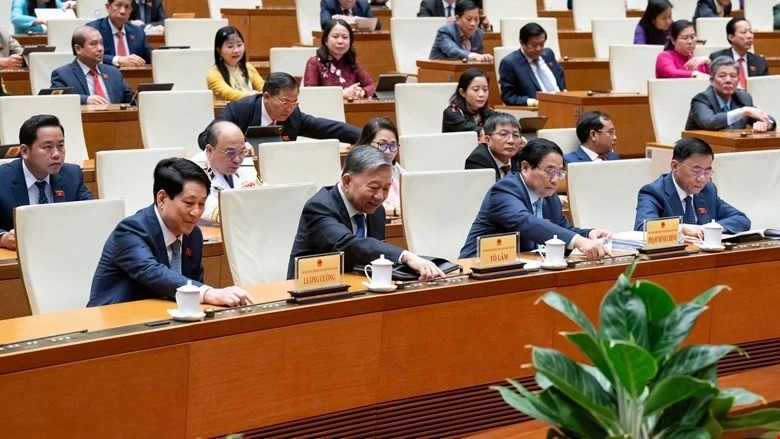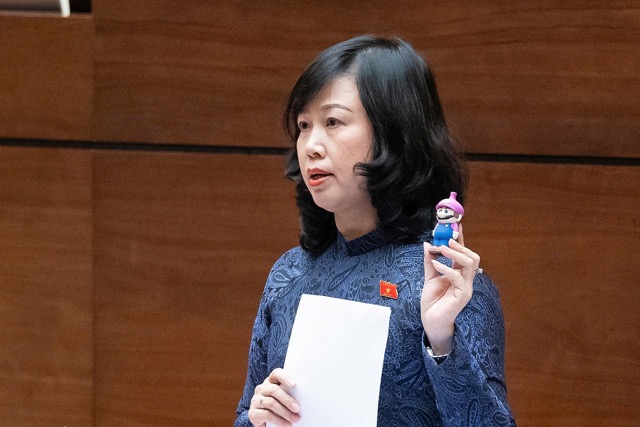This is not only a strong step forward in public health policy, but also clearly demonstrates the determination of the National Assembly, the Government and the Ministry of Health in preventing a new danger that is quietly spreading among young people.
The ban on e-cigarettes is a great victory for the National Assembly, not only in the legislative aspect, but also in humanistic value, in the long-term vision of national health. This is a great success for the Vietnamese political system, marking an important turning point in the work of preventing the harmful effects of tobacco, opening a new phase in the strategy of protecting public health - where all decisions are aimed at people, for a healthy, smoke-free Vietnam.
Strengthening the implementation of Resolution 173, tightening the ban on e-cigarettes in the coming time is an action to bring the National Assembly's resolution into life, contributing to caring for and protecting public health.
E-cigarette ban policy - a turning point in public health management
Lao Dong Newspaper has just published a series of articles "E-cigarette Underground Market", reflecting the worrying situation: Despite the ban, e-cigarette products still seep into life, especially among young people.
The series of articles has received the attention and voice of many National Assembly deputies, raising big questions about the responsibility of state management, about the loopholes being exploited to form an underground market, threatening public health.
Looking back at the process of policy development and promulgation, it is necessary to affirm that the ban on e-cigarettes is a strong, correct and historic decision of the National Assembly, the Government and the Ministry of Health - marking an important victory in the fight to protect people's health, especially the younger generation.

For many years, e-cigarettes have become a major concern for policymakers and healthcare professionals. Under the guise of less harmful than traditional cigarettes, e-cigarettes quickly seep into life, especially among young people and students. Many studies have shown that e-cigarettes contain high levels of nicotine, along with many toxic chemicals that can cause addiction, seriously affecting the nervous system, respiratory and cardiovascular system.
In that context, the National Assembly's ban on e-cigarettes is considered a bold but necessary decision, aimed at preventing this harm from the root. Resolution 173/2024/QH15 - passed by high consensus - clearly demonstrates the spirit of "prevention over treatment", proactively protecting future generations from the risk of nicotine addiction and its social consequences.
A lung disease expert at Bach Mai Hospital shared that this decision is very correct and timely. In fact, e-cigarettes and heated tobacco products have caused many concerns about public health, especially for young people. Banning these products not only helps protect users but also contributes to creating a cleaner environment for the community.
In addition, banning e-cigarettes and heated tobacco products is also an effective strategy for Vietnam to fulfill its commitment to reduce the harmful effects of tobacco under the National Tobacco Harm Prevention and Control Program, while protecting people's health from potential risks from these addictive products.
This is one of the policies of the legislative, executive and health sectors that has achieved strong consensus, in the context that many countries in the world are still fiercely debating whether to ban e-cigarettes or not. Vietnam, with this decision, has shown a clear stance: Public health cannot be exchanged for short-term economic benefits.
The National Assembly's decision has received strong support from health organizations, social organizations and the community.
The more challenging it is, the more it affirms the correctness and timeliness of the decision
According to many experts, the ban on e-cigarettes is not only a technical decision, but also demonstrates the political vision and public ethics of the National Assembly and the Government. In the context of e-cigarettes being a "billion-dollar" industry, with great pressure from interest groups, Vietnam's choice to say no to this product is a brave move, demonstrating the spirit of putting people's health first.
During the discussion in the National Assembly, many delegates emphasized that e-cigarettes are not only an issue for the health sector alone, but a social challenge - from education, e-commerce to cybersecurity management. Therefore, the ban on e-cigarettes is a synchronous contribution of the entire system, aiming to prevent the threat from spreading in a generation increasingly vulnerable to social networks and new consumer trends.

Resolution 173/2024/QH15 is therefore considered a great success in public policy, as it lays a solid legal foundation for protecting public health in the digital age.
Next, the Prime Minister issued Decision No. 1665/QD-TTg promulgating the Plan to implement Resolution No. 173/2024/QH15 dated November 30, 2024 of the National Assembly on questioning activities at the 8th Session of the 15th National Assembly on the ban on the production, trading, import, storage, transportation and use of electronic cigarettes and heated tobacco products.
Although highly appreciated, the ban on e-cigarettes will certainly face many challenges in the implementation process, especially the situation of smuggling and advertising in cyberspace. However, as National Assembly deputies have repeatedly emphasized, the existence of these challenges further affirms the correctness and timeliness of the decision to ban e-cigarettes.
The implementation of the ban will be an opportunity for authorities to strengthen management capacity, modernize monitoring tools, improve digital reconnaissance and traceability, as well as strengthen coordination between ministries and branches. This is a necessary shift for Vietnam to move towards a more comprehensive, modern and effective tobacco control environment.
The ban on e-cigarettes is not only a policy decision, but also a statement of the National Assembly's social responsibility, clearly demonstrating the courage and vision in putting people's health above all economic benefits.
As a series of articles by Lao Dong pointed out, the ban is only really effective when accompanied by strict supervision and synchronous coordination. The underground market of electronic cigarettes is taking advantage of cyberspace, cross-border sales channels, and loopholes in market management to continue operating.
This is the time to need the stronger participation of functional forces - police, market management, customs - while promoting propaganda and education so that people, especially adolescents, clearly understand the harmful effects and stay away from this product.











